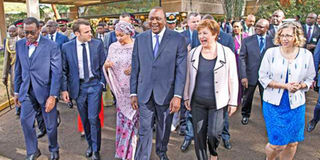Uhuru pledges to achieve over 10pc forest cover in the next three years

President Uhuru Kenyatta (centre) and President Emmanuel Macron (second left) of France among other Heads of State and delegates, arrive for the One Planet Summit and the Fourth Session of the United Nations Environment Assembly at the United Nations Office Complex, Nairobi, March 14, 2019. PHOTO | PSCU
What you need to know:
Currently, Kenya has a forest cover of seven per cent, which pushed President Kenyatta’s administration to issue a ban on logging as a tree planting campaign proceeds.
- The One Planet Summit is an annual gathering of government, corporate and civil society leaders to discuss methods of battling climate change, alongside pledges to embrace clean energy such as wind, geothermal and solar.
Kenya Thursday made a pledge to achieve at least 10 per cent forest cover in the next three years, even as the country struggles with fresh cases of settling in woodlands.
While opening the third annual One Planet Summit, President Uhuru Kenyatta made the vow while also indicating his government has identified the forestry sector as a key investment to hitting its development targets.
CLEAN ENERGY
Currently, Kenya has a forest cover of seven per cent, which pushed President Kenyatta’s administration to issue a ban on logging as a tree planting campaign proceeds.
The One Planet Summit is an annual gathering of government, corporate and civil society leaders to discuss methods of battling climate change, alongside pledges to embrace clean energy such as wind, geothermal and solar.
The first two editions were held in Paris, France, and New York, United States of America, respectively.
It is the first time the summit is being held in Africa, with President Kenyatta hosting over 450 high-ranking officials from various sectors at the United Nations Office Complex in Nairobi.
Other Heads of State present include France’s Emmanuel Macron, Democratic Republic of Congo’s Felix Tshisekedi and Madagascar’s Andry Rajoelina. Rwanda’s Prime Minister Édouard Ngirente represented the East African state.
United Nations deputy Secretary-General Amina J. Mohamed, World Bank interim President Kristalina Georgieva and African Development Bank (AfDB) President Akinwumi Adesina also made presentations at the summit. Former Prime Minister Raila Odinga also attended.
SPACES GAZETTED
President Kenyatta’s vow came just days after the National Land Commission (NLC) allowed thousands of squatters to settle on a 419 acre piece of land in Karura Forest that has been at the heart of a row with the Kenya Forest Service.
The disputed land row has played out for 23 years.
The vow also came nearly a month after the NLC revealed that hundreds of title deeds relating to grabbed land — including spaces gazetted as forests — are yet to be expunged despite being declared illegal.
President Kenyatta argued that deforestation has hit Kenya hard, as its effects have interfered with economic progress.
Interim World Bank head Georgieva backed President Kenyatta’s sentiments when she highlighted the rapid shift from the harsh 2017 drought to last year’s countrywide floods.
Both disasters claimed over 200 lives and saw the government divert billions of shillings to fight the effects.
“Our forestry has been identified as a key sector of investment to realise our goals and our government has set clear targets to achieve global sustainability development goals,” said President Kenyatta.
CLIMATE CHANGE
He added: “Today we are here to show commitment and, on behalf of Kenya, our government and people, I am pledging that by 2022 we want to reach a minimum of 10 per cent forest cover in our country as a way of ensuring that we play our part as a government, as people and as members of the global community.”
AfDB’s Mr Adesina stressed that combating climate change will need efforts from governments and the private sector alike.
He announced at the summit that the lender would dedicate $25 billion (Sh2.5 trillion) to financing projects combating climate change.
The amount, he added, is 34 per cent of the multilateral lender’s total financing and is in line with AfDB’s push to encourage African countries to abandon coal for clean energy.
“We want African countries to move away from coal. AfDB is starting a fund to get more people moving away to renewable energy,” Mr Adesina said.
But the multilateral lender’s stand is a sharp contrast to its decision to fund the controversial Lamu coal power plant being developed by a consortium of Gulf Energy, Centum Investments, General Electric and Power Construction Corporation of China.
The Lamu coal plant is set to cost Sh206 billion. The project has met opposition from civil society groups in Kenya and beyond.
FELLOWSHIPS
The World Bank has also pledged to support the fight against climate change.
Ms Mohammed said that placing technology and the youth, especially girls, at the forefront of battling climate change, would go a long way.
She also encouraged the Western world to partner with African nations to pool funds for environmental conservation and restoration.
“The fight against climate change should not be for them, it should be with them. The youth need a seat at the table of decision making,” Ms Mohamed said.
Her sentiments were echoed by the director of African Women in Agricultural Research and Development (Award), Dr Wanjiru Kamau-Rutenberg, who added that technology must be embraced by all.
Dr Rutenberg’s Award has a $150 million (Sh15 billion) grant which will be used to invest in young scientists through fellowships.
Dr Rutenberg believes that increasing the number of women leading research will also attract more girls to science and technology.
But one of the hindrances currently suffered in the shift to clean energy is high cost.





